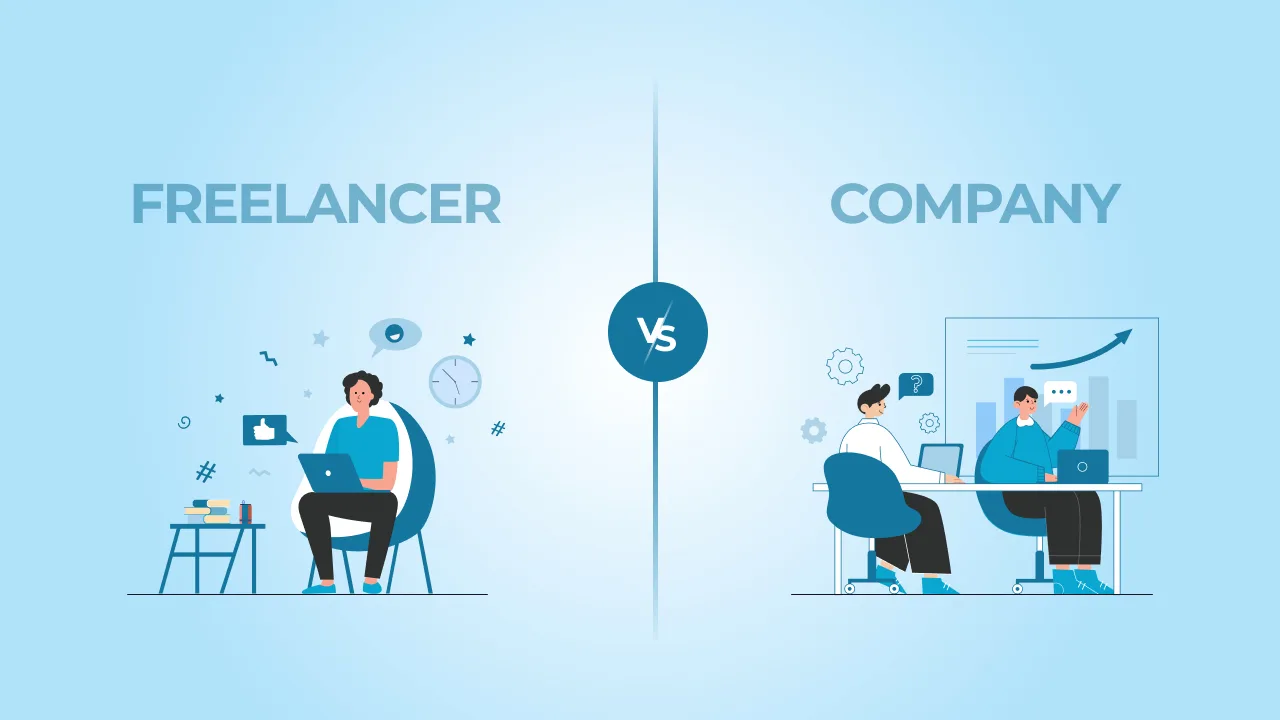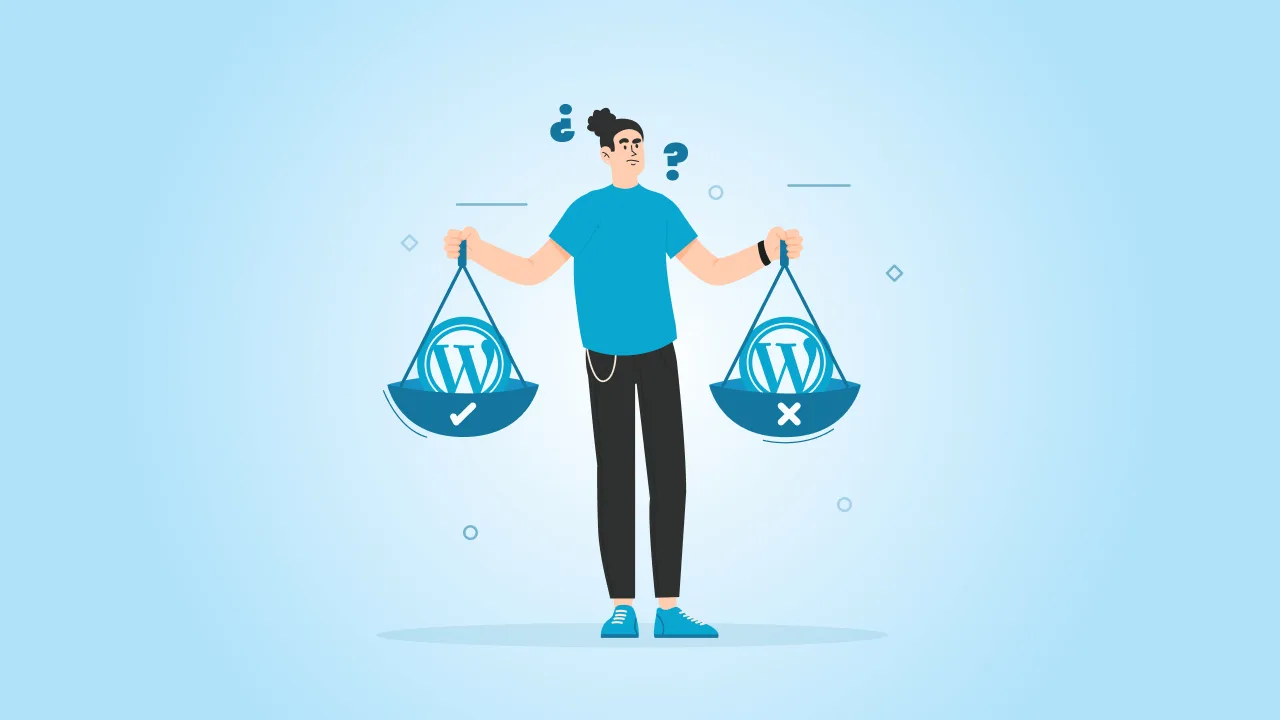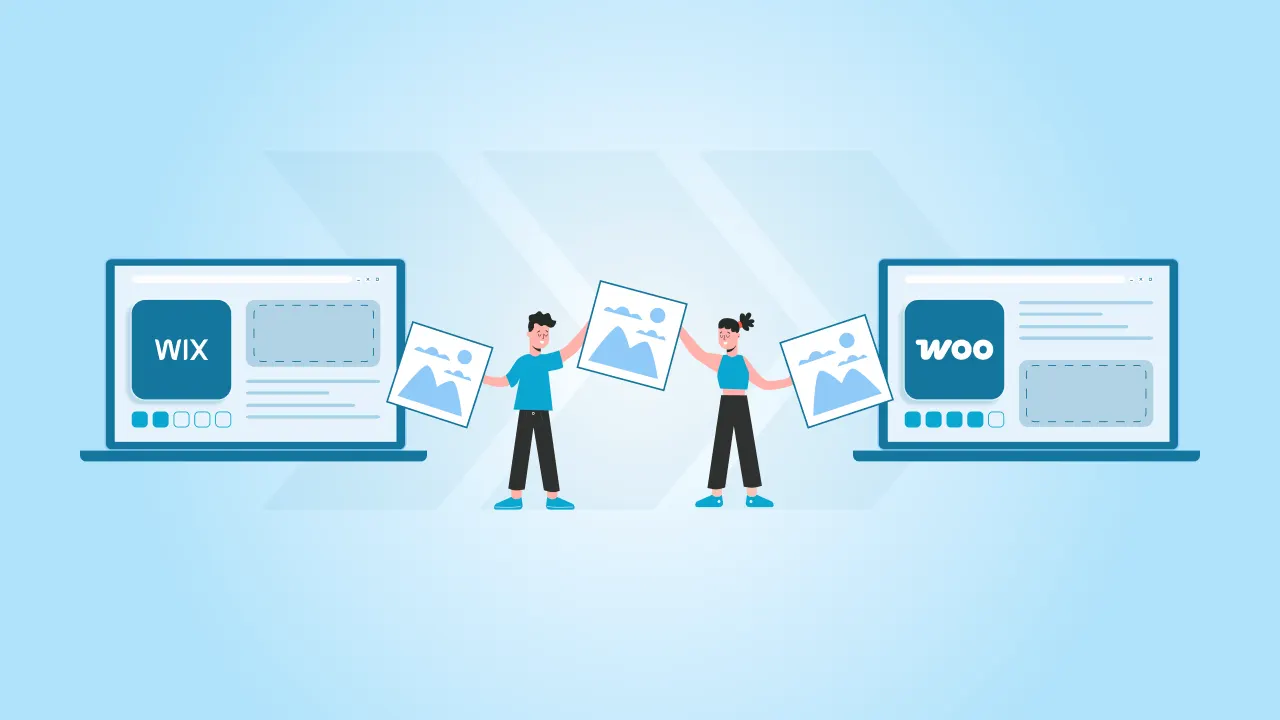For many people, “WordPress” and “building a website” go hand in hand. In fact, it’s one of the first names that comes up when you start looking into how to create a site. WordPress has been around for years, and it powers a huge number of websites across the internet.
But that doesn’t mean it’s the right fit for everyone.
Like any tool, WordPress has its strengths and its downsides. In this post, we’ll take a closer look at the pros and cons of WordPress to help you decide if a WordPress site makes sense for your needs.
⏰ 60-Second Summary
- WordPress is a popular content management system that powers millions of websites, offering flexibility for blogs, business sites, and eCommerce stores.
- It’s free and open source, with thousands of themes and plugins, but it requires regular updates and some technical know-how for advanced customizations.
- Key features include an easy-to-use dashboard, SEO-friendly structure, mobile responsiveness, and deep customization options.
- WordPress is a great fit for bloggers, small business owners, online store owners, and anyone who wants control over their site.
- It’s not ideal for everyone, especially if you want something low-maintenance or super simple, but for many, the flexibility is worth it.
What is WordPress and What Does It Do?
WordPress is a content management system (CMS) that lets you build and manage a website without needing to write code from scratch. It started as a simple blogging platform but has grown into a flexible tool that powers everything from personal blogs to full-scale eCommerce sites.
There are two versions to know about:
- WordPress.org – This is the self-hosted WordPress option. You download the WordPress software for free, choose your own web hosting, and have complete control over your site. It’s the more popular and flexible option.
- WordPress.com – A hosted version where your site lives on WordPress’s servers. Easier to get started, but with more limitations unless you pay for premium plans.
Most people who want full flexibility, use themes and plugins, and grow their site over time, go with the self-hosted WordPress.org route.
Whether you’re building an online store, a blog, or a professional site for your business, WordPress offers a huge amount of flexibility. That’s a big reason it’s behind more than 40% of all websites on the internet.
From theme development to plugin integration, we build WordPress sites that work the way you need.
Key Features of WordPress
So now that you know what WordPress is and how it works, you might be wondering—what exactly makes it so popular? What can it do for you?
That’s where WordPress starts to shine. It’s not just that it lets you build a website—it’s that it gives you the tools to build almost any kind of website, with surprising ease. From bloggers to business owners to developers, people keep choosing WordPress because of the features baked right into the platform (or just a plugin away).
Let’s take a closer look at some of the standout features that make WordPress such a powerful content management system.
1. The WordPress Dashboard
The WP dashboard is the heart of your website—think of it as your site’s command center. It’s clean, user-friendly, and designed to give you access to everything from blog posts to media uploads to plugin settings. Whether you’re publishing content, tweaking your theme, or moderating comments, this is where it all happens.
It’s especially great for beginners, but powerful enough to satisfy more experienced users too.
2. Themes and Plugins
One of WordPress’s biggest strengths lies in its massive library of themes and plugins. You can completely change the look and feel of your site in minutes using a WordPress theme, or extend functionality with WordPress plugins—from SEO tools to contact forms to full-scale ecommerce systems.
Want something truly unique? You can create or commission a custom WordPress theme to match your brand exactly.
3. SEO-Friendly by Design
Getting found online is important for every business, and WordPress makes it easier. Its structure is already optimized for search engines, with features like clean URLs, fast page loads, and content hierarchy. Plus, it works seamlessly with popular SEO plugins like Yoast SEO, helping you fine-tune your content for better search engine rankings.
4. Mobile Responsiveness
In today’s world, most people are browsing on mobile devices, and WordPress is built with that in mind. Most modern WordPress themes are fully responsive, meaning your site will look great on phones, tablets, and desktops—no extra work required.
5. Full Customization and Control
With WordPress, you’re not boxed in. You can customize almost every part of your site, whether that’s through custom CSS, drag-and-drop builders like Elementor, or by editing the theme files directly. This makes WordPress ideal for businesses and creators who want complete control over how their site looks and behaves.
6. Easy Integration with Tools Like Google Analytics
Want to understand your site visitors, track performance, or optimize your content strategy? WordPress makes it simple to integrate with tools like Google Analytics and many others. You can also connect email marketing services, CRMs, payment gateways, and more, giving your site the power to do much more than just display information.
Pros (Advantages) of WordPress
Now that you know what WordPress can do, let’s talk about what makes it such a popular choice for millions of users. These are the real-world advantages that set WordPress apart—not just its features, but how those features translate into value for you.
1. It’s Affordable to Get Started
One of the biggest draws of WordPress is that the software itself is completely free. You only need to pay for web hosting and a domain name to get your site online.
For many small business owners, freelancers, and bloggers, this low barrier to entry is a major win.
You can launch a professional site without needing a huge upfront budget.
2. You Own Your Website
With a self-hosted WordPress site, you’re in control. Unlike some website builders that keep your content locked into their ecosystem, WordPress gives you full ownership of your files, data, and design.
That’s ideal if you want the freedom to switch hosting providers or expand your site down the line.
It’s your website—no strings attached.
3. Grows With You Over Time
Whether you’re starting a small blog or building a large eCommerce site, WordPress is designed to scale.
You can begin with a simple setup and add new features, pages, or integrations as your needs evolve. There’s no need to start over as your business or audience grows.
That flexibility makes it a smart long-term investment.
4. Huge Community and Support Resources
One underrated advantage? You’re never alone. With such a massive user base, the WordPress community has built a huge ecosystem of tutorials, forums, videos, and plugins to help solve just about any problem.
From troubleshooting issues to learning something new, help is always a search away. There’s even a network of WordPress experts if you need professional help.
5. No Lock-In to a Proprietary Platform
WordPress is an open-source platform, which means no company owns it, and no one can suddenly take it away or change its pricing structure on you.
You’re free to modify, move, and expand your site however you like, with no vendor lock-in.
This kind of freedom is rare with other website builders or proprietary CMS platforms.
Cons (Disadvantages) of WordPress
While WordPress is a powerful and flexible CMS platform, it’s not without its drawbacks. From ongoing WordPress maintenance to performance issues, here are some important limitations to consider before choosing WordPress.
1. Requires Regular Maintenance
One of the main cons of WordPress is that it requires frequent updates for the core WordPress software, plugins, and themes. Neglecting updates can create security vulnerabilities and compatibility issues.
If you’re running a business site or an eCommerce store, these maintenance tasks can become time-consuming without proper management tools or support.
2. Security Concerns
Because it’s such a widely used and best CMS platform, WordPress is a frequent target for hackers. Using too many or poorly coded plugins and themes can make your site more vulnerable. Choosing a secure hosting provider and installing WordPress security plugins is essential for maintaining site security.
You’ll also need to monitor suspicious activity and ensure regular backups in case something goes wrong.
3. Performance Issues with Too Many Plugins
Adding too many features can slow down your WordPress site. Overloading it with various plugins can impact site speed, user experience, and even affect your search engine optimization.
To keep performance optimized, you may need tools like caching, image optimization, or a hosting service that specializes in WordPress hosting.
4. Learning Curve for Advanced Users
While WordPress is easy for beginners, customizing it deeply may require coding knowledge in PHP, HTML, or CSS. For more complex needs, you might need help from WordPress web development agency or professional web developers.
This can increase costs and make it harder for non-technical WordPress users to maintain 100% control over their sites.
But even with those drawbacks, WordPress continues to be the platform of choice for millions of users, and for good reason. The key is knowing who it’s right for. Depending on what kind of website you’re trying to build, WordPress might be the perfect fit… or it might not.
So, who is WordPress made for?
Who Should Use WordPress?
The truth is, WordPress isn’t just for one type of user. Its strength lies in its flexibility—it can be as simple or as powerful as you need it to be. Below are some of the most common types of people and projects that thrive on the WordPress platform.
Bloggers and Content Creators
If your main goal is to share content, like long-form articles, recipes, travel diaries, or niche commentary, WordPress was built with you in mind. It began as a simple blogging platform, and that DNA still runs deep. Tools like tags, categories, SEO plugins, and easy formatting options make it a top choice for anyone serious about content.
Plus, you’re not stuck with a generic layout. With free themes or a custom WordPress theme, your blog can look and feel exactly how you want it to, without needing to touch a single line of code.
Small Business Owners
For small business owners, budget and flexibility matter, and WordPress delivers both. You can launch a sleek, professional site for a fraction of what a custom build would cost. Whether you’re running a local shop, offering services, or building your brand online, WordPress gives you the tools to get found, build trust, and convert visitors into customers.
With options for premium WordPress themes, free plugins, and easy integrations like Google Analytics, you’re never starting from scratch.
eCommerce Store Owners
Running an online store? WordPress + WooCommerce is a powerhouse combo. Whatever you sell- handmade crafts, digital downloads, or subscription boxes- WordPress can support your entire operation, from storefront to checkout to customer management.
You get full ownership, no hefty platform fees, and the flexibility to add features as your eCommerce store grows. Want a custom checkout flow? A members-only shop? You’re in charge.
Freelancers, Agencies, and Developers
For people who build websites for others, WordPress is a dream platform. It’s flexible, fast to deploy, and endlessly customizable. You can reuse your favorite themes and plugins, create a unique look with custom code, or even develop bespoke solutions for clients.
And because it’s so widely adopted, clients are often already familiar with the WordPress dashboard, which makes training and hand-off easier.
Educators, Coaches, and Course Creators
Selling online courses or gated content? WordPress has you covered. With plugins for learning management systems (LMS), user roles, memberships, and payments, you can turn your site into a full-fledged education platform, without relying on third-party course providers.
You stay in control of your pricing, your content, and your audience.
Nonprofits and Informational Sites
Not every site is about selling. Some are about spreading ideas, raising awareness, or building a community. WordPress makes it easy to launch beautiful, functional informational sites—and because so many of its features are absolutely free, it’s a budget-friendly option for nonprofits or passion projects.
Is WordPress the Right Choice for You?
WordPress is a solid option for a lot of people, but that doesn’t mean it’s perfect for everyone.
If you want flexibility, room to grow, and the ability to really shape your site the way you want, WordPress is worth considering. It works well whether you’re starting a blog, building a business site, or launching an online store. Plus, there’s a huge community behind it, which means you’re never really on your own.
That said, it does take a bit of work. You’ll need to keep things updated, learn the basics of how it all fits together, and sometimes troubleshoot when things don’t go as planned. If you’re looking for a “set it and forget it” solution, it might feel like a bit much.
In the end, it comes down to what you need and how hands-on you want to be. For many people, the control and flexibility are worth it. For others, a simpler platform might make more sense.
Either way, it’s good to know what you’re getting into, so you can build something that works for you, not the other way around.
If you’re exploring other options, check out WordPress alternatives to see what else might fit your needs.
Off-the-shelf themes not cutting it? At cmsMinds, we design and develop custom WordPress solutions tailored to your business goals.





